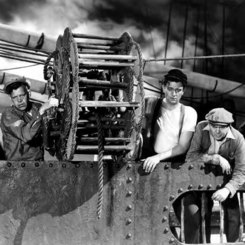The Long Voyage Home
May 27, 2016
(John Ford, United States, 1940, 35mm, 103 min)
Restored 35mm print!
The powers and fascinations of director John Ford and playwright Eugene O’Neill are happily met in this 1940 feature dramatizing the lives of men who serve as crew members aboard commercial freighters. Like O’Neill, Ford nursed a lifelong obsession with sailing and the sea, and had spent his early years in Portland, Maine, amid the maritime culture that this picture describes.
Adapted and updated by screenwriter Dudley Nichols (Ford’s frequent collaborator) from four of O’Neill’s early plays set aboard the fictional “SS Glencairn,” the film recounts the experiences of the ship’s crew while transporting ammunition from the West Indies to England during World War II. The story thus presents four mini-dramas, each with its own catharsis, while neatly making general points about the specialized society in which these men live — disregarded by callous superiors, consigned to repeated voyages for lack of better work, and developing codes of honor and friendships that sustain them through the severe physical and psychological hardships of their lives.
Nichols and Ford expertly martial the unconventional, four-part structure to create recurrent emotional surges, akin to the ebb and flow of great waves, as endurance and loyalty are tested again and again. The various anecdotes underscore the pressures that so often lead to bouts of drinking and brawling (tantamount to bonding), and just as often, to the decision to ship out on yet another grueling voyage. Richard Hageman’s music score underlines the same “ebb and flow” movement, adroitly counterposing the spirited shanty “Blow the Man Down” with the plaintive “Harbor Lights,” contrasting the urge to adventure with the longing for home.
Ford makes ingenious use of an admirable group of character actors, whose personification of the tight-knit crew collapses the space between stars and supporting players, taking full advantage of sterling dialogue and weighty dramatic opportunities. Particularly impressive are Thomas Mitchell as swaggering “Driscoll,” a fractured character in the best O’Neill tradition, and Mildred Natwick in her first film role as a Cockney prostitute in a harbor saloon.
A penetrating portrait of the dispossessed, the film was not a financial success, but showcases numerous talents to wonderful advantage, and as an incidental fact, was purportedly greatly admired by Eugene O’Neill, who was said to have screened the film privately numerous times.
--- Shannon Kelley
